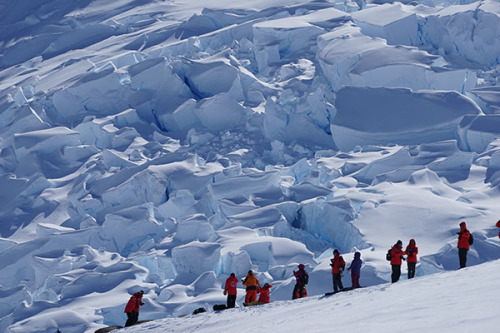 Chinese tourists reach the South Pole during a group trip. (Photo/China Daily) Booming activities require more complete legal guide, expert says A leading Chinese expert on international maritime law has called for the acceleration of legislation on booming Chinese activities in Antarctica. China has been making great efforts to produce legislation relating to Antarctica, with academic research dating to at least 1993 and government sponsored studies dating to 1998, according to Zhang Haiwen, director of the China Institute for Marine Affairs and a top political adviser. A draft law has been listed on the State legislature's agenda since late last year, while the State Oceanic Administration, the central government body overseeing Antarctic issues, has drafted three departmental rules to regulate China's activities in the continent. The latest of the rules, the Environmental Protection Regulation on Activities in Antarctica, was issued in February, said Zhang, who is a member of the 13th National Committee of Chinese People's Political Consultative Conference. "With these rules, the State Oceanic Administration has been organizing activities in the southernmost continent in strict accordance with the Antarctic Treaty and the Protocol on Environmental Protection of the Antarctic Treaty, which provides comprehensive protection for the Antarctic environment," she said. Yet the increase in Chinese activities on the continent, including scientific research and tourism, has made it necessary to make an immediate step forward in drafting a law, considering the shortcomings of the rules, she said. Last year, the number of Chinese tourists to the continent grew to almost 5,300, from barely 100 in 2005. Tourists are usually sent to a third country like Chile before joining trips organized by foreign travel agencies. With the boom in activities, the shortcomings of the current Chinese rules on Antarctica have been more obvious. "As departmental rules, they can regulate only institutes instead of individuals," Zhang said. "It's impossible to impose sanctions on individuals with these rules, though they have specific clauses about what people cannot do." A law with specific criminal and civil liabilities is needed to keep visitors from unlawful actions, which may damage the environment, she said. "It will be a complicated process, and a lot of issues are listed in the national legislature's agenda. But it's urgent we fill the gap as soon as possible, ... especially because it's an international concern," she said. She said the State Oceanic Administration has made a lot of preparations for legislation, which should be enough to start legislation procedures, though more work still needs to be done. Legislation on the Antarctic is a requirement of the Protocol on Environmental Protection of the Antarctic Treaty, which China joined in 1994, and is important to maintaining the country's international image as a responsible power, she said. The protocol requires member countries to take necessary measures, including legislation, to guarantee implementation of the protocol, she said. Timeline 1993: Researchers from China Institute for Marine Affairs start academic research into Antarctic legislation. 1998: The Chinese Arctic and Antarctic Administration commissions the marine affairs institute to conduct legislation studies. 2004: The marine affairs institute concludes its report on Antarctic legislation, which includes basic law articles, legislative principles and suggestions on main parts of the law. Around 2007: The State Oceanic Administration, which oversees the Arctic and Antarctic administration, starts drafting departmental rules on Antarctica. 2010: The State Council lists a plan to draft national rules on Antarctica. 2017: The Standing Committee of the National People's Congress announces that Antarctica is on its legislation agenda. |
Powered by Discuz! X3.4
© 2001-2013 Comsenz Inc.